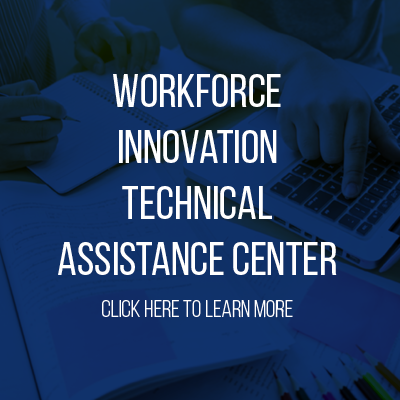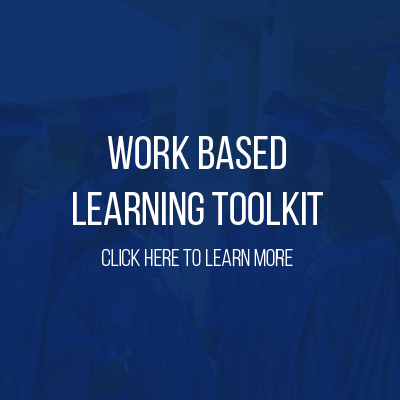Career Pathways
Just like their peers, youth and young adults with disabilities desire to have a meaningful career after they finish school. Developing strong career pathways for all youth, including youth with disabilities, is a critical activity to ensure a successful transition into adulthood. Along a career pathway, a youth will ideally engage in work-based learning opportunities including:
- Job shadowing: Job shadowing entails pairing a youth with an employee in a business related to the career interests of the youth to learn the essential aspects of the job, organization and certain behaviors or competencies.
- Internships: Internships are paid or unpaid work experiences within for-profit and/or not-for-profit organizations that expose youth to the world of work on a “trial” basis to build work skills and to help youth better frame their career pathways.
- Service learning: Service-learning refers to learning that actively involves experiences which often benefit others and the community, while also advancing the goals of a given curriculum.
- Mentoring: A mentor is a person who through support, counsel, friendship, reinforcement and constructive example helps another person to reach his or her work and life goals. Mentoring relationships provide valuable support to young people by offering not only academic and career guidance, but also effective role models for leadership, interpersonal and problem-solving skills.
- Workplace tours: Workplace tours allow individuals to explore and observe occupations.
- Informational interviewing: Informal interviewing is a way to discuss opportunities with employers, develop work experiences, build a network and discover new places of work and jobs of interest.
- Summer work experiences: Summer work experiences are specific employment opportunities set up in partnership with the educational or workforce system where the wages are paid through participation in U.S. Department of Labor, vocational rehabilitation or other initiatives.
- Apprenticeships: Apprenticeships are an industry-driven, high-quality career pathway where employers can develop and prepare their future workforce, and individuals can obtain paid work experience, classroom instruction and a portable credential.
- Paid employment: Paid employment is the employment of youth in initial jobs to build basic work skills that assist in building a foundation for a future career path.
Points for Policymakers: The backdrop of the Workforce Innovation and Opportunity Act (WIOA) (2014), as well as other key federal and state legislation, has provided a legislative construct to support the integration of career preparation and work-based learning experiences for youth with disabilities that include:
- Access to accommodations and supports in career pathway programs
- Accessible technology in academic, technical, and employment training settings
- Provision of reasonable accommodations in the workplace
- Training on rights to disability-related accommodations
- Training on disability disclosure decision-making
- Training on how to approach employers about accommodation requests
- Assistance finding and performing work in competitive, integrated employment settings
- Access to accommodations and supports in career pathway programs
Policy/Program Examples
Internships/ Other Work
- Camp LEAD: Oregon Vocational Rehabilitation
- Camp LEAD (Leadership, Empowerment, Advocacy, Development) is a weeklong, immersive leadership camp that helps youth with disabilities develop self-advocacy and social skills while giving them paid work experience and career exposure in the natural resources industry. This camp is made possible through a partnership with the Youth Transition Program (YTP), a program within Oregon Vocational Rehabilitation and Oregon State Parks. Camp LEAD serves youth with disabilities ages 16 to 22.
- SWIFT: Oregon Vocational Rehabilitation
- SWIFT (Summer Work Internship for Transition) is a seven-week program at Portland State University where students live in the dorms and work at paid internships. Students from all over Oregon will get a taste of work, independent living and more. In addition, SWIFT students engage in activities and classes for career exploration. They learn work skills and build friendships with peers while gaining confidence and awareness with a focus on their future career goals.
- Work-Based Learning Resources—Virginia
- The Work-Based Learning Resources through Virginia’s CTE Resource Center provides a variety of resources on job shadowing, mentorship, internship, service learning, clinical experience, student apprenticeship and cooperative education.
Apprenticeships
- Delaware Department of Labor, Division of Employment and Training, Office of Apprenticeship and Training
- Delaware Department of Labor, Division of Employment and Training, Office of Apprenticeship and Training has developed a new Registered Pre-Apprenticeship Program to complement its existing Registered Apprenticeship programs. The office will approves the program providers and posts a list of qualified pre-apprenticeship programs on its website.
- Being a part of a pre-apprenticeship program is ideal for individuals who lack experience or education but want to build a solid foundation to start a successful career. As Delaware’s unemployment rate drops, disadvantaged and underrepresented populations will be at a greater risk of being left behind. Pre-Apprenticeship opportunities will allow these populations to gain the needed hard and soft skills for a successful career.
- Maryland Apprenticeship and Training Council: MD Department of Labor
- The Maryland Apprenticeship and Training Council has approved three new registered apprenticeship programs and eight new youth apprenticeship employers.
- Pre-Apprenticeship in Career Education (PACE) program:
- New Jersey Gov. Phil Murphy today announced the first-ever grant recipients for Fiscal Year 2019’s PACE program, as well as two Notices of Grant Opportunities — the second Growing Apprenticeship in Nontraditional Sectors (GAINS) grant and the first-ever Expanding Pre-Apprenticeships in a New Direction (ExPAND) grant.
- Wisconsin Youth Apprenticeships
- Wisconsin provides employers with a range of information related to youth apprenticeship to support their engagement in offering paid work-based apprenticeship experiences.
Trainings
- Advising Youth with Disabilities on Disclosure: Tips for Service Providers: ODEP
- The 411 on Disability Disclosure: National Collaborative on Workforce and Disability
- Job Accommodation Network
- The Job Accommodation Network (JAN) is a free service of the U.S. Department of Labor’s Office of Disability Employment Policy. JAN consultants have been providing job accommodation information since 1983 when JAN was founded. In addition, JAN consultants have been providing information about the Americans with Disabilities Act (ADA) since 1992 when the ADA went into effect. Over the years, JAN consultants have developed practical ideas to help employees understand the ADA and request and negotiate reasonable accommodations in the workplace.
- Massachusetts Empower Your Future Career Readiness Curriculum Guide
- This guide is a free resource developed by the Commonwealth Corporation with funding from the Massachusetts Department of Youth Services. It includes lessons on various soft skills and other aspects of career readiness and planning.
- Colorado Individual Career and Academic Plan Implementation Toolkit
- The Colorado Department of Education has also developed an Individual Career and Academic Plan Implementation (ICAP) Toolkit which provides implementation and process guidance. The Colorado toolkit provides a section on the history and context of Individual Career and Academic Plans as well as key messages and talking points for presentations and written communication materials.
Integrated Classroom Legislation
- Pennsylvania (PA) H 522: Career and Technical Education Investment Incentive Program
- Amends the Public School Code, revises provisions relating to the Career and Technical Education Investment Incentive Program, repeals the increase of tax credits.
- Includes competency-based applied learning that contributes to the academic knowledge, higher-order reasoning and problem-solving skills, work attitudes, general employability skills, technical skills, occupation-specific skills and knowledge of all aspects of an industry, including entrepreneurship
Vocational Rehabilitation Programs
ASPIRE: Colorado Department of Labor and Employment, Division of Vocational Rehabilitation
225 randomly assigned to ASPIRE services, receiving enhanced services such as:
- Parent education and training provided by Peak Parent Center
- Benefits planning provided by Ability Connections Colorado
- Paid employment during high school
- Youth self-determination training provided by Peak Parent Center
- Family financial education provided by Budget Right LLC
- Comprehensive case management division of vocational rehabilitation staff
- Iowa Self-Employment (ISE) is a program designed for clients of Iowa Vocational Rehabilitation Services (IVRS) or Iowa Department for the Blind (IDB) whose vocational goal is self-employment. While IVRS mainly focuses on helping job candidates get hired by someone else, the ISE program provides technical and financial assistance to help qualified individuals with disabilities achieve self-sufficiency and work at their optimum level by starting, expanding or purchasing a business. The business itself must be “for-profit” and Iowa-based. Referrals to the ISE program are made by IVRS and IDB counselors. The ISE program provides:
- Financial assistance
- Technical assistance
- Microenterprise ISE
- Full ISE
Creating Access to Successful Employment (CASE) Project: Kentucky Career Center
- Project CASE was created to increase the numbers of individuals with disabilities who are training and working in these fields by finding and/or developing flexible and innovative training and postsecondary approaches to skill attainment.
- Career Pathway Coordinators increase the capacity of Kentucky’s Office of Vocational Rehabilitation and Office for the Blind in reaching employers who can provide work experiences, such as job shadowing, internships, apprenticeships and, ultimately, job placement in these pathways.
- Through Rehabilitation Services Administration (RSA) grant funding, Project CASE will provide direct services to eligible individuals in the seven counties of Metro Louisville (KentuckianaWorks) and 23 counties in Eastern Kentucky (Eastern Kentucky Concentrated Employment Program [EKCEP]).



